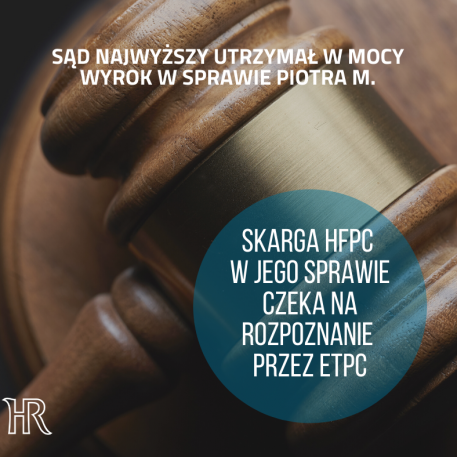
Supreme Court upholds conviction of Piotr M. HFHR application awaits hearing in Strasbourg
♦ The Supreme Court ruled on the Ombudsman’s cassation appeal, upholding the judgment of the Court of Appeal in Łódź issued in the high-profile case of Piotr M., a man with an intellectual disability convicted of double homicide.
♦ For more than 6 years, Piotr’s case has been handled by Innocence, the HFHR-operated programme devoted to remedying miscarriages of justice.
Background
The offence attributed to Piotr was committed in November 2010 in a small town near Kalisz. The police found Piotr 10 months later, having received an anonymous tip putting him close to the crime scene at the moment when the homicides were committed.
Piotr was arrested in August 2011. The police claim that he confessed during a preliminary interview. Knowing about the confession and suspecting his intellectual disability, the police officers nevertheless interviewed him as a witness. They informed him that as a witness, he was obliged to tell the truth or face criminal penalties. Later on, the police interviewed Piotr on two separate occasions as a suspect, giving him the standard notice of suspects’ rights.
Each time, Piotr gave a different version of the events in which he had allegedly been involved. The versions differed in many details, including the murder weapon and the place where it was hidden. The final version of events appearing in Piotr’s testimony was fully confirmed by the evidence collected by the police. However, his testimony revealed no additional evidence, whereas the actual perpetrator would likely have told the interrogators things that the police did not or know could not have known at the time. Law enforcement authorities secured several traces at the scene, including a bloody fingerprint, but none was matched to Piotr.
“This puts a very big question mark on whether the actual testimony Piotr gave as a witness and suspect has ever found its way into the transcripts of his interviews”, says Marcin Wolny, HFHR lawyer who has been working on Piotr’s case from the moment the Foundation became involved. “This is even more important as no evidence of Piotr’s guilt was found throughout the criminal proceedings and, according to his interrogators, Piotr admitted to having taken part in the incident after being presented with a possible course of events.
Concerns over the investigation, HFHR submits an application to the ECtHR
After the case was decided by the national courts, the HFHR was persuaded to bring Piotr’s case before the ECtHR. In the application, the Foundation argues that the man was deprived of legal assistance during his suspect interviews and that his testimony was improperly recorded. The application is currently awaiting consideration by the ECtHR.
Almost simultaneously, the Ombudsman joined Piotr’s case, bringing a cassation appeal in on his behalf. The Ombudsman argued, among other things, that the appeal drafted by Piotr’s lawyer had been incorrectly examined, and in particular that the Court of Appeal in Łódź had failed to refer to the allegation that the transcripts of Piotr’s interrogation as a suspect had been incorrectly compiled, which was shown, inter alia, by unclear indications of the wording of the questions asked and precise answers given.
“The employed record-keeping method actually prevents the identification of the originator of the information recorded in the transcript, so you can ask the question: was it the interrogator or the person interviewed? This aspect is crucial if you consider that the defendant was a person with an intellectual disability”, Mr Wolny concludes.
Supreme Court’s reasoning
In the verbal reasoning of the cassation ruling, the Supreme Court disagreed with the Ombudsman’s arguments. The Supreme Court noted that the Ombudsman’s allegations were similar to those already reviewed by the Supreme Court. However, this conclusion itself has not resulted in the rejection of the cassation appeal as manifestly unfounded. Instead, the Supreme Court held that the allegation concerning the transcripts of Piotr’s interviews was, in essence, identical to an allegation already assessed during the appellate proceedings before the Court of Appeal in Łódź. The Supreme Court was therefore not obliged to separately address the allegation of irregularities in the transcripts of the interviews.
Referring to the second limb of the Ombudsman’s cassation appeal, the Supreme Court ruled that there were no facts to substantiate the allegation that Piotr’s confession was preceded by the interrogators suggesting him what to testify as to how the events unfolded. According to the Supreme Court, this theory is contradicted by a number of facts, including the detail of Piotr’s account; the fact that he would not be able to repeat so many details after the police officers, as well as inaccuracies concerning the murder weapon. According to the Supreme Court, if the interrogators had presented Piotr a possible course of events, they would have told him about the real murder weapon.
The Supreme Court’s judgment is final and subject to no means of challenge.


11.02.2020
 Cookies EN
Cookies EN